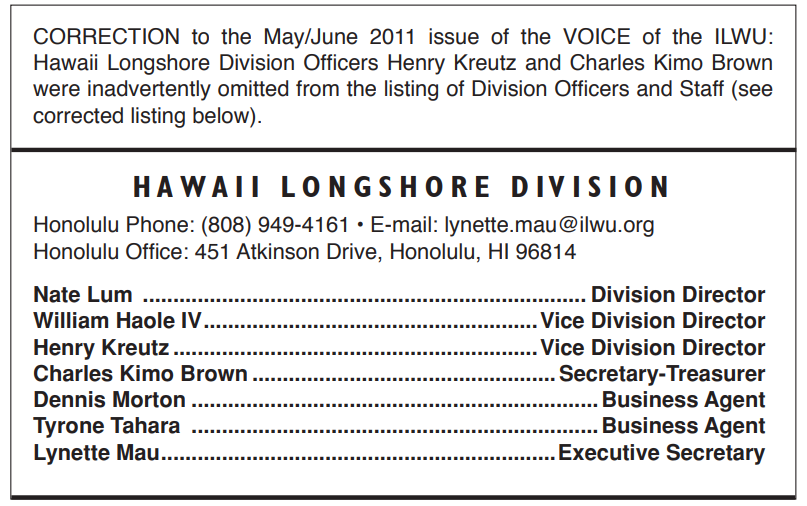The 2011 Session of Hawaii’s State Legislature was preoccupied with trimming $1.2 billion from the cost of operating the state’s government, but a number of important laws were passed which will benefit workers.
Partial unemployment benefits
In response to concerns raised by members who were “attached” to a regular employer but their work hours were reduced or they were laid off due to temporary closure of their companies, the ILWU had a bill introduced, and passed, to address the issue of Partial Unemployment benefits. The new law, which took effect July 1, will: (1) remove the sunset on provisions for Partial Unemployment and make those provisions permanent;
(2) exempt work search and registration requirements for those receiving Partial Unemployment benefits; and (3) codify “good cause” reasons for any worker receiving benefits to quit a part-time job.
This means, for example, when a hotel shuts down for months due to major renovation of the property, employees who are still attached to the employer can apply for Partial Unemployment benefits and will not be required to look for work to qualify for benefits. However, if they get a part-time job while laid off, the first $150 of earnings every week is disregarded in the calculation of the worker’s benefit, which is paid in full. So they receive full Unemployment benefits and can keep $150 of their wages each week.

No discrimination for sick leave use
After several years of trying, a law was finally passed this session to prohibit “barring,” “withholding pay,” or “demoting” an employee for use of sick leave. The law applies only to employers with 100 or more employees and a collective bargaining agreement in place. The bill had been introduced to address the growing practice among employers to unilaterally institute or to negotiate so-called “no-fault” attendance policies that would consider any absence, regardless of the reason, as an incident that could accumulate and lead to discipline.
Under these policies, an employee who is absent due to legitimate illnesses could be disciplined up to and including discharge. The ILWU testified that this practice is contrary to other sections of collective bargaining agreement that provide for sick leave. Furthermore, such no-fault policies encourage employees to come to work sick or face loss of income.
The bill passed and became law on July 1. However, administrative rules must be promulgated to clarify the law and will be subject to public hearing.
Enforcement of the Dislocated Worker Law
In 1987, Hawaii’s Dislocated Worker Law was enacted as result of the abrupt mass layoff of ILWU members at Airport Holiday Inn on New Year’s Eve. The Dislocated Worker Law now requires employers to give 60 days notice or the equivalent in pay for this period. However, when employers violate the law, workers themselves, or their union, had to file a lawsuit for relief. This is what the ILWU was told when one company proposed to place workers on “no work offered” (and no pay) status for the 60 days. Under the new law enacted this year, the State Department of Labor is specifically authorized to enforce the Dislocated Worker Law.
Also passed and supported by the ILWU
Civil Unions. Despite opposition from anti-gay marriage and conservative religious groups, SB232 passed with little organized opposition and was the first bill signed into law this session. The failure of the opposition to unseat an openly gay legislator in last year’s elections and the election of a Governor strongly supportive of civil unions signaled the bill’s smooth passage and enactment.
The ILWU Local PAC voted to support civil unions as a civil rights issue. This bill adds a new chapter to the Hawaii Revised Statutes which provides for two individuals to enter into a civil union with the same rights, benefits, protections, and responsibilities as a married couple of the opposite sex.
Transgender equity. The law was amended to add gender identity and expression to the list of illegal discrimination under Hawaii’s civil rights law. Section 378-2 of Hawaii Revised Statutes now reads:
“It shall be an unlawful discriminatory practice: because of race, sex, including gender identity or expression, sexual orientation, age, religion, color, ancestry, disability, marital status, or arrest and court record...”
It shall be unlawful to discriminate against any individual for these reasons in employment, union membership, housing, public accommodations, or access to services receiving state financial assistance.
Relief from Mortgage Foreclosures. SB 651 provides for a temporary mortgage foreclosure dispute resolution program and authorizes conversion from non-judicial to judicial foreclosure. The ILWU testified in support of this bill.

